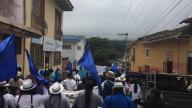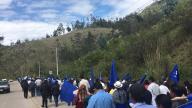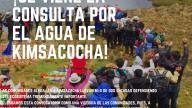Toronto-based INV Metals is fighting tooth and nail to dispel investor worries over a local vote concerning its Loma Larga project in south-central Ecuador. INV Metals is over 35% owned by IAMGOLD, the former owner of the Loma Larga project. Despite recent statements claiming strong community support for the project, the company is noticably distressed over an upcoming referendum.
In late November, about the same time as the company released a feasibility study for the project, the Ecuadorian National Electoral Council (CNE) approved a long-awaited vote in Girón County over whether local citizens are agreement with mining in their headwaters.
Scheduled for March 24th, local residents will vote yes or no to the following question: “Are you in agreement that mining activities occur in the paramos and water sources of the hydrological system of Kimsacocha?”
The referendum coincides with local elections of provincial, municipal, county, and rural parish representatives.
On December 6th, INV Metals Ecuador submitted an appeal of the decision to the General Secretary the CNE. The submission was signed by Jorge Barreno as both General Manager and Legal Representative of the company. The appeal was denied on December 22.
Since late January, when the CNE confirmed that the referendum would be held in tandem with the March elections, company representatives have started threatening to sue Ecuador in the case that its investment is upset by the vote.
On February 8th, Jorge Barreno, in an interview with El Comercio, publicly stated: “This is only just beginning. There is still a long road ahead to make sure the law is followed, and we are not discarding [the possibility] of an international demand.”
After company threats became public, the Ecuadorian Ministry of Mining took legal action to try to revoke the consultation process in Girón, arguing that the consultation process was “unconstitutional.” The Ministry’s appeal was denied on February 13th when the Vice Minister of Mines, Fernando Benalcazar, noted in an interview that the “no” vote could mean a loss of $700 million.
That same day, INV Metals released an “update” on Loma Larga in which it reported on the consultation process. It calls the referendum “unconstitutional”, echoing the Ministry of Mines and Energy claim. Notably, in recent months, the company has expressed nothing but confidence in their community relations.
What is INV Metals worried about?
Girón is one of two counties affected by INV Metals’ Loma Larga project and an important site that the company has designated for project infrastructure and treated water disposal. The processing and tailings facilities for the project are proposed to be constructed within Girón County. The power line required to service the mine is planned to pass through Girón, and the majority of workers are anticipated to live there, given that the access road passes through the county.
INV hopes to get approval for its environmental licence and secure financing for the Loma Larga project by this summer.
Unbelievably, the company stated in its February 13 press release that if the referendum returns an unfavorable and enforceable result, it will, in consultation with authorities and local communities, discuss options for the processing facilities which may include their relocation. Such changes, however, would presumably require significant technical consideration and economic re-evaluation.
Furthermore, if the company considers moving the infrastructure to the neighbouring county of Cuenca, it will run into further opposition. In late January 2017, the Council of the County of Cuenca declared its territory, páramos (high altitude moorlands), fragile and threatened ecosystems, and water sources free of metal mining. Rural communities that would be downstream of the underground mine in the county of Cuenca have long rejected the project. The quality of local water supplies is highly cherished in the county of Cuenca, including the city of Cuenca, the country’s third largest.
Given tensions over the project in the city of Cuenca, the company suggested in its November press release that the project would not affect the city, as itCuenca is located on one side of the continental divide and Girón on the other. The company’s feasibility study shows that treated water from the mine would be discharged on the Girón side instead of in the watershed affected Cuenca. Nonetheless, the mine would still be built in the county of Cuenca with corresponding risks to water quality and quantity.
Local residents demonstrate opposition to mining in lead up to March 24 vote
Meanwhile, local communities in the county of Girón are gearing up for the referendum.
On February 10th, the Community Water Systems of the County of Girón organized a march from the community of Santa Marianita to the centre of Girón county. The march kicked off the local electoral period and the campaign for the referendum, and was organized “in favour of the páramo and water of Kimsakocha.”
Following the march and a Catholic mass, members of the Federation of Campesino and Indigenous Organizations of Azuay (FOA from its initials in Spanish) urged candidates to publically sign a committment to not accept any mineral royalties if elected. The act further stated that in the case that they accept mining royalties, the citizens of Girón will revoke their mandate. All of the candidates present in the march signed the commitment.
Ringing out strongly throughout the public demonstration, people chanted:
“We don’t sell our water, we defend it! When the referendum comes, Girón votes no!”
The communities of Girón and many other local organizations in the area are demanding that their vote be respected and binding. If their voices are not respected, Jhonny Tapia, of the Community Water Systems of Giron, warns, “There will be a county, provincial. and even national uprising in Ecuador.”
We’ll be watching closely as the March 24th consultation vote approaches.




